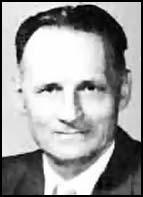Alan H. Belmont
(policeman) | |
|---|---|
 | |
| Born | 1907 New York City, New York State, USA |
| Alma mater | San Diego State College, Stanford University |
Assistant to director J. Edgar Hoover who ran the FBI cover-up after the JFK assassination; participated in COINTELPRO; and denied the existence of the Mafia. | |
Alan H. Belmont was a senior leader at the FBI.
In June, 1961, Belmont was assistant director under J. Edgar Hoover, in charge of all investigative work. This included the investigation of the assassination of John F. Kennedy. According to Donald Gibson (The Kennedy Assassination Cover-Up): "Alan Belmont... was the primary official in charge of FBI activities following the assassination. It is Belmont, not Hoover, who ran the FBI cover-up."[1]
According to William C. Sullivan, Belmont played an important role in smearing leaders of the civil rights movement including the campaign against Martin Luther King.[1]
Early life
Born in New York City, he grew up in San Diego, California., and attended San Diego State College. He received a bachelor's degree in accounting from Stanford University in 1931.[2]
Career
Belmont joined the FBI as a special agent in 1936 and was assigned to field offices in Birmingham, Alabama, and Chicago. He transferred to FBI headquarters in 1938.[2]
Three years later, he was made a supervisor in the New York office. He was assistant special agent in charge in Chicago in 1942, special agent in charge in Cincinnati in 1943, and special agent in charge in New York in 1944.[2]
He held this post until 1950 when he was transferred to Washington and became head of the Domestic Intelligence Division. He now had responsibility for investigating the Mafia. In 1953 he wrote a memo to assistant director, D. M. Ladd: "The Mafia is an alleged organization... The organization's existence in the U.S. is doubtful."[1]
In 1961, he became assistant to director J. Edgar Hoover, the number three position at the FBI.[2]
Belmont retired from the FBI in 1965 and was replaced as assistant director by Cartha DeLoach.
After retiring, Belmont became executive assistant to the director of The Hoover Institution on War, Revolution and Peace at Stanford University.[2]